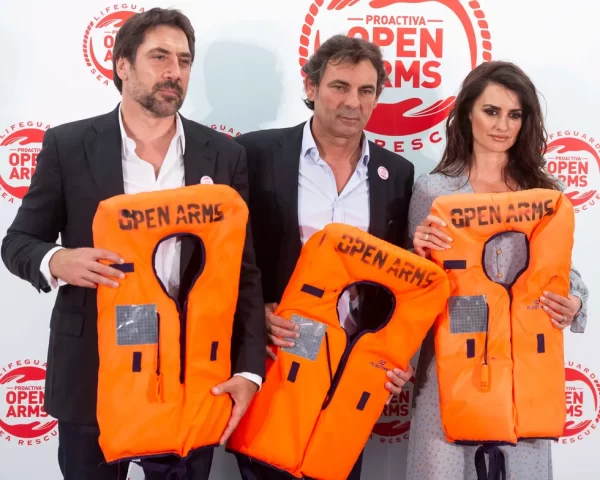The 2022 Moro Spanish Film Festival opens in Brisbane on Thursday 28 April with a line-up of 34 Spanish language films made up of 21 features from Spain, 10 from Latin America including Argentina, Mexico, Uruguay and the Dominican Republic and another three from Australia and the USA and features a range of genres from period-set movies, realist drama and documentary, to satire and comedy.
The festival features well-known faces, including Antonio Banderas, Oscar Martínez, Paco León and Blanca Portillo along with new talent. It also focuses on two Spanish actors who’ve been together since the filming of Vicky Cristina Barcelona in 2007, Penélope Cruz and Javier Bardem, with two titles in which they co-star: Jamón Jamón (1992), their first film together when Cruz was 16, now celebrating its 30th anniversary; and Loving Pablo (2017), based on Virginia Vallejo´s memoir about her love affair with notorious drug lord Pablo Escobar — plus Cruz’s latest collaboration with Pedro Almodóvar, Parallel Mothers (2021).
Comments on two films I have seen so far follow.
Mediterráneo: The Law of the Sea
In autumn 2015, profoundly affected by news of refugees trying to reach various nearby Greek islands via Turkey and, in particular, the heart-wrenching photograph of two-year-old Alan Kurdi, a Syrian refugee who drowned near the Turkish city of Bodrum, two Spanish lifeguards, Òscar (Eduard Fernández) and Gerard (Dani Rovira), travel to the Greek island of Lesbos to offer assistance. They arrive to discover a shocking reality: thousands of people risking their lives every day, crossing the sea in precarious vessels, fleeing from armed conflicts and other miseries in their home countries — with many drowning. What stands out most is that no one is doing any rescue work.
Together with Òscar’s daughter Esther (Anna Castillo) and other members of the team, they fight to do what none of the Greek authorities are tasked with doing, and provide support to thousands of people who desperately need it. (With Òscar’s fervent commitment, the situation slowly changes to one of Greek solidarity with the visitors, but not before Òscar has spent time in jail. At one point, when he’s accused of criminal activity, Òscar declares: ‘We are the only ones here obeying the law, the law of the sea’.) For all involved the initial voyage becomes a life-changing odyssey.
From director Marcel Barrena, this moving docu-drama reveals a saga of ruptured and reunited families. Based on the true story of the founder of Open Arms, Òscar Camps, Mediterráneo is a tale of humanity, justice and solidarity. A Spanish-based non-profit organisation, Open Arms’ mission is to search and rescue refugees who try to reach Europe by sea and support them. Beginning with almost nothing, then acquiring two jet skis, Open Arms now operates three rescue ships in the Mediterranean and maintains a permanent base on Lesbos. Between 2015 and 2020 the organisation rescued 60,000 women, men and children from the sea.

It was the very same image of the drowned two-year-old refugee that also drew renowned Chinese-born artist Ai Weiwei to Lesbos (in 2016) where he promptly had himself photographed on a pebbled beach in similar pose to the dead boy and the photograph was then widely distributed. Fellow artists and arts commentators questioned the wisdom of his actions at the time, myself included, raising questions on the ethics of this and similar projects. But there’s no doubt that the politically active Ai Weiwei feels strongly about the global issue of Europe’s refugee crisis. He went on to direct and produce the powerful two-hour documentary, Human Flow (2017) and many other ambitious artworks in support of refugees and their plight — including Law of the Journey (2017), a 60-metre-long inflatable crowded with anonymous refugee figures of black rubber at the 2018 Sydney Biennale.
Òscar Camps and Open Arms would no-doubt condemn Australia’s inhumane and criminal treatment of our refugees and asylum seekers, particularly our policy of offshore detention with its appalling outcomes. Ai Weiwei put similar judgements on record in 2018.
Parallel Mothers
Acclaimed director Almodóvar returns with Parallel Mothers, a lovely drama featuring Penélope Cruz, winner of Best Actress at the 78th Venice Film Festival. It’s a wonderful performance by Cruz with a delightful delivery of dialogue coupled with her inimitable facial expressions.
Astutely balancing drama and comedy, Parallel Mothers tells the story of two women, both single mothers, who give birth in a shared maternity ward in Madrid. Both women harbour fears and unresolved emotions over failed relationships, seeking support in one another and wandering hospital halls with mutual apprehension for what the future holds.
The festival includes the premiere of Our Voices (Nuestras Voces). A reflection on the strength and resilience of immigrants, Diana Paola Paez’s documentary tells the story of a group of Spanish-speaking migrants who arrived in Victoria between the 1960s and 1980s, highlighting their contribution to modern Australian culture.
The 2022 Moro Spanish Film Festival is in Brisbane at Palace James Street and Palace Barracks from 28 April to 18 May.
More information: www.spanishfilmfestival.com
Cover image: Òscar (Eduard Fernández) and Gerard (Dani Rovira) in Mediterráneo: The Law of the Sea


